While evaluations of Donald Trump’s handing of specific issues related to the coronavirus outbreak are fairly similar to his overall job rating (44% approve), Americans view Trump’s performance on some dimensions better than on others.
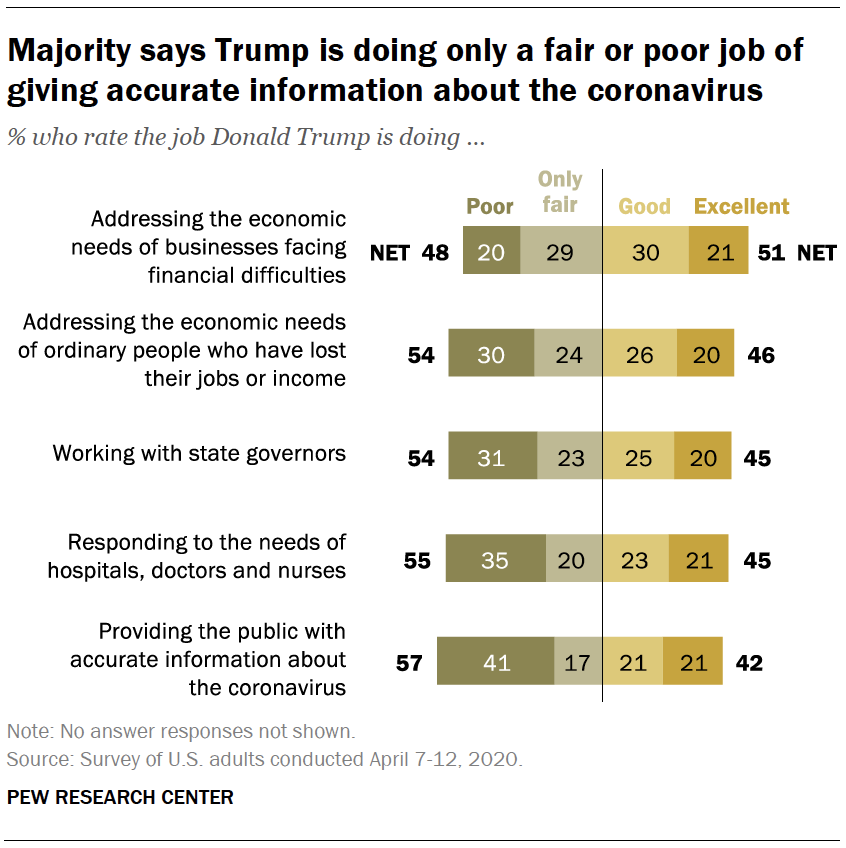 Trump receives his most positive ratings for how he is addressing the economic needs of businesses facing financial difficulties. About half of Americans (51%) say the president is doing an excellent or good job addressing the needs of businesses, while 48% say Trump is doing an only fair or poor job.
Trump receives his most positive ratings for how he is addressing the economic needs of businesses facing financial difficulties. About half of Americans (51%) say the president is doing an excellent or good job addressing the needs of businesses, while 48% say Trump is doing an only fair or poor job.
Slim majorities say that Trump is doing an only fair or poor job of addressing the economic needs of ordinary people affected by the outbreak (54%), working with state governors (54%) and responding to the needs of hospitals, doctors and nurses (55%).
Trump gets lower ratings for providing accurate information about the coronavirus to the public. A majority (57%) says Trump is doing an only fair or poor job of providing accurate information, including about four-in-ten (41%) who say he is doing a poor job of this. About four-in-ten say Trump is doing an excellent (21%) or good (21%) job of providing accurate information.
Republicans and Republican leaners are much more likely than Democrats and Democratic leaners to say that Donald Trump is doing an excellent or good job dealing with key aspects of the outbreak than Democrats and Democratic leaners. Three-quarters of Republicans say Trump is doing an excellent or good job of providing accurate information about the coronavirus to the public, including 40% who say he is doing an excellent job of this. Among Democrats, just 13% say Trump is doing an excellent or good job providing accurate information, while seven-in-ten say he is doing a poor job.
Partisans are similarly divided over Trump’s performance in responding to the needs of hospitals, doctors and nurses and working with state governors. In each case, about eight-in-ten Republicans say Trump is doing an excellent or good job, compared with just 14% of Democrats. About two-in-ten Democrats (18%) and about eight-in-ten Republicans (78%) say Trump is doing an excellent or good job addressing the economic needs of ordinary people who have lost their jobs or income.
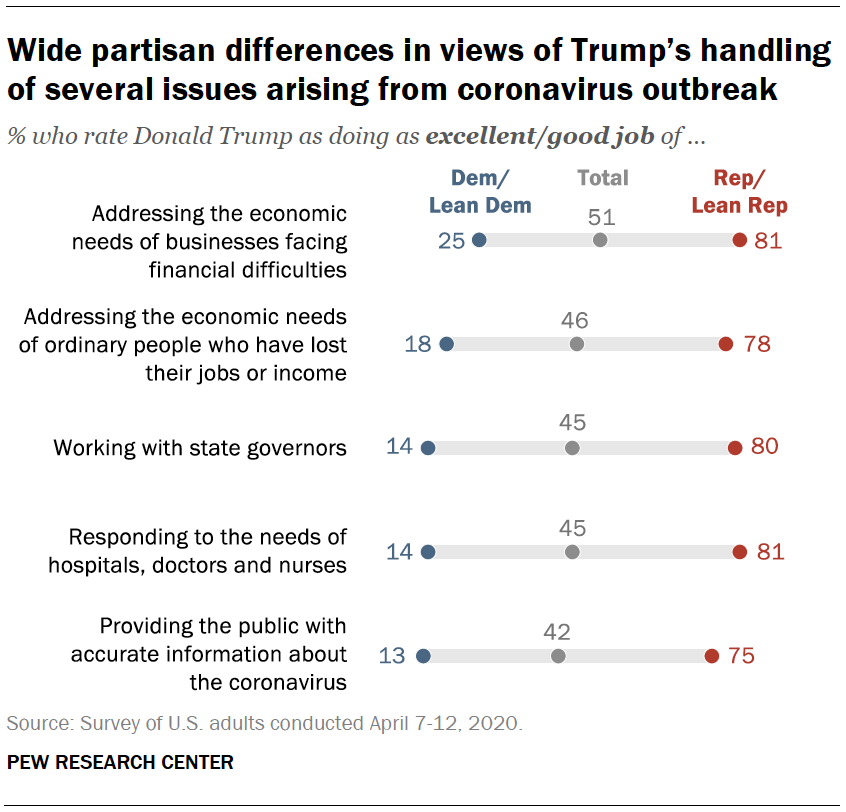 Democrats rate Trump most positively when it comes to addressing the economic needs of businesses, with one-quarter of Democrats saying he is doing an excellent or good job of this. Republicans are much more positive. About eight-in-ten Republicans and GOP leaners say Trump is doing an excellent or good job of addressing the needs of businesses impacted by the outbreak.
Democrats rate Trump most positively when it comes to addressing the economic needs of businesses, with one-quarter of Democrats saying he is doing an excellent or good job of this. Republicans are much more positive. About eight-in-ten Republicans and GOP leaners say Trump is doing an excellent or good job of addressing the needs of businesses impacted by the outbreak.
Nearly two-thirds of Americans say Trump administration’s response to coronavirus was ‘too slow’
By a nearly two-to-one margin, more Americans say that, as coronavirus cases were first reported around the world, Trump was “too slow” to take major steps to address the threat of the outbreak to the United States: 65% hold this view, while 34% say he was quick to take major steps.
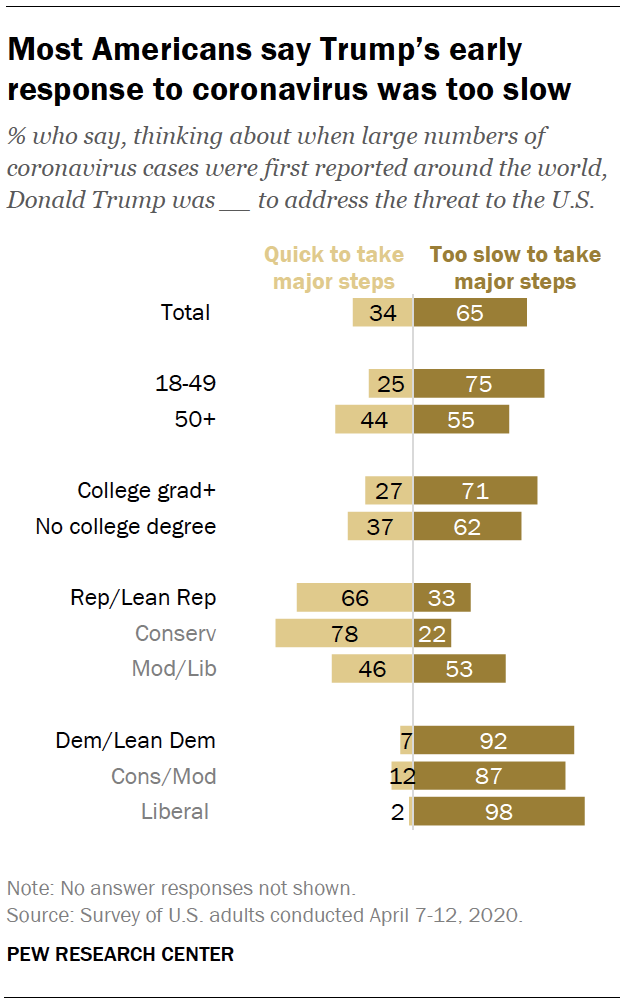 Adults under age 50 are considerably more likely to say Trump was too slow to act than those 50 and older (75% vs. 55%, respectively). And while majorities of those in all educational groups hold this view, those with a college degree are more likely to say this than those without: 71% of those with a bachelor’s degree or more education say Trump was too slow to take action, while 62% of those without a college degree say the same.
Adults under age 50 are considerably more likely to say Trump was too slow to act than those 50 and older (75% vs. 55%, respectively). And while majorities of those in all educational groups hold this view, those with a college degree are more likely to say this than those without: 71% of those with a bachelor’s degree or more education say Trump was too slow to take action, while 62% of those without a college degree say the same.
Democrats and Democratic-leaning independents overwhelmingly say Trump was too slow in his response: 92% say this, including 98% of liberal Democrats and 87% of conservative and moderate Democrats.
There is a wider ideological divide in these views within the GOP. Overall, roughly two-thirds of Republicans (66%) say Trump was quick to take major steps to address the COVID-19 threat to the U.S. But roughly half of moderate and liberal Republicans say he was too slow to address the outbreak: 53% say this, while 46% say he was quick to respond. By comparison, conservative Republicans are decidedly of the view that Trump was quick to respond: 78% say this, while just 22% say he was too slow.
Republicans who live in counties that have seen the fewest coronavirus deaths are far less likely than others to say Trump’s response was ‘too slow’: 25% say this compared with at least four-in-ten Republicans who live in counties that have seen a moderate (45%) or high (43%) number of deaths.
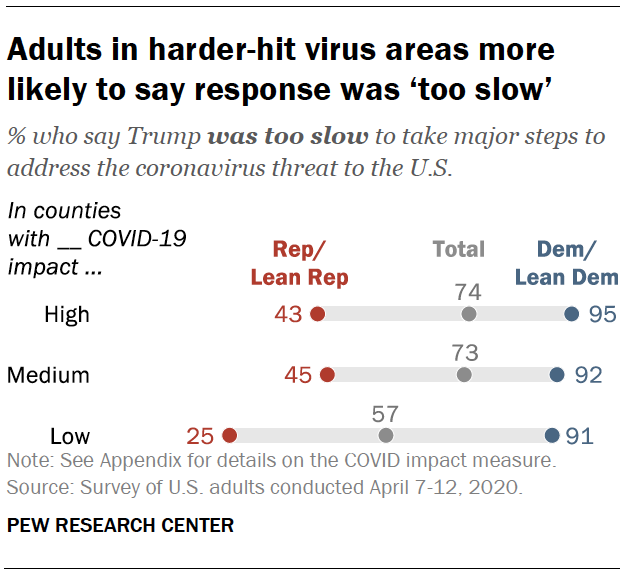 There is considerably less geographic variation among Democrats. At least nine-in-ten Democrats and Democratic leaners say Trump’s response to the coronavirus threat was not quick enough – regardless of the severity of the outbreak in their own county.
There is considerably less geographic variation among Democrats. At least nine-in-ten Democrats and Democratic leaners say Trump’s response to the coronavirus threat was not quick enough – regardless of the severity of the outbreak in their own county.
Overall, sizable majorities of adults who live in counties that have experienced comparatively large numbers of coronavirus deaths say Trump was too slow to take major steps. Nearly three-quarters of Americans in counties with the highest number of deaths say the response wasn’t quick enough. A nearly identical share of adults in areas that have been hit moderately hard by coronavirus deaths also say this (73%).
How is Trump characterizing the outbreak?
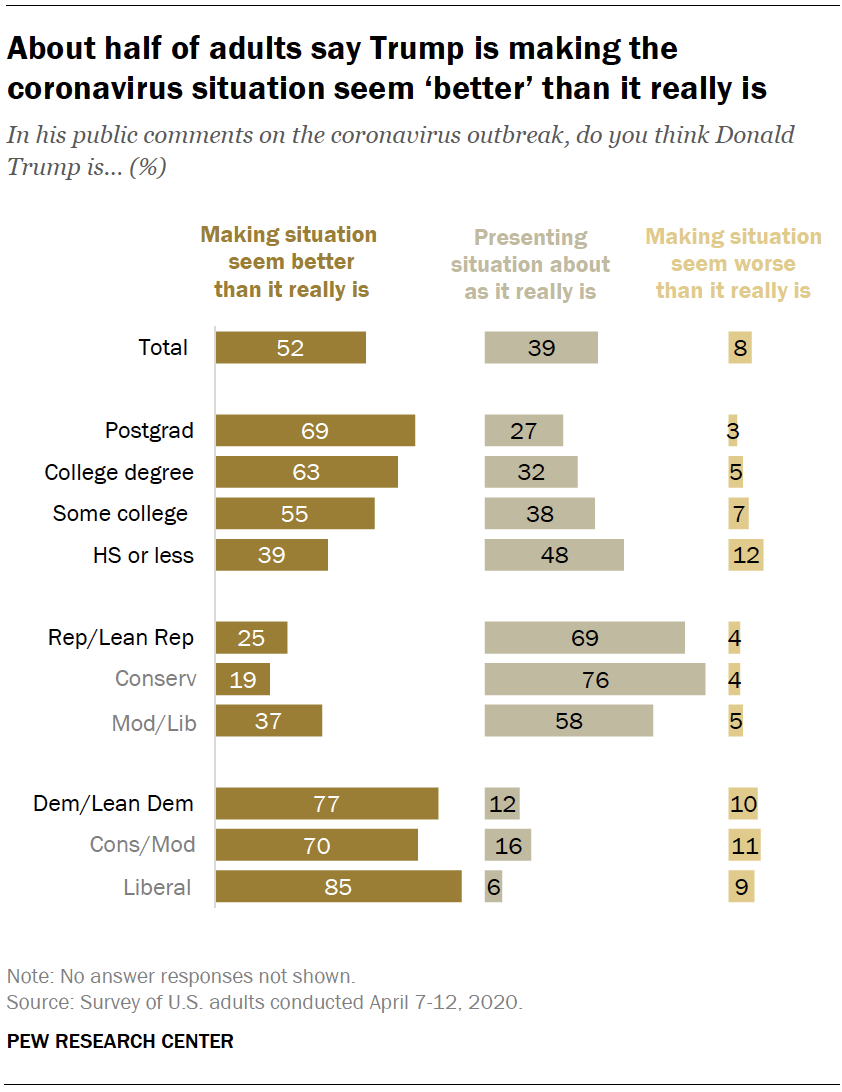 About half of Americans (52%) say that Trump’s public comments on the coronavirus outbreak are making the situation seem better than it really is. Fewer (39%) say he is presenting the situation about as it really is, while just 8% say he is making the situation seem worse than it really is.
About half of Americans (52%) say that Trump’s public comments on the coronavirus outbreak are making the situation seem better than it really is. Fewer (39%) say he is presenting the situation about as it really is, while just 8% say he is making the situation seem worse than it really is.
Adults with higher levels of educational attainment are particularly likely to say Trump is presenting the situation too positively: 69% of those with a postgraduate degrees say this, as do 63% of those with a four-year college degree. Those with less education – especially those with a high school diploma or less – are more likely to take the view that Trump is presenting the situation about as it really is.
Nearly seven-in-ten Republicans (69%) say Trump is characterizing the outbreak accurately, including 76% of conservative Republicans. A narrower majority of moderate and liberal Republicans (58%) say the same, while 37% of this group say Trump is making the situation seem better than it really is.
About three-quarters of Democrats (77%) say Trump is making the situation seem better than it really is, with liberals more likely than conservatives and moderates to say this (85% vs. 70%, respectively).
GOP split over acceptability of elected officials criticizing Trump administration’s coronavirus response
Roughly two-thirds of adults (66%) say it is acceptable for elected officials to criticize the Trump administration’s response to the coronavirus outbreak if they think it is not being handled well, while a third (33%) say this is not acceptable.
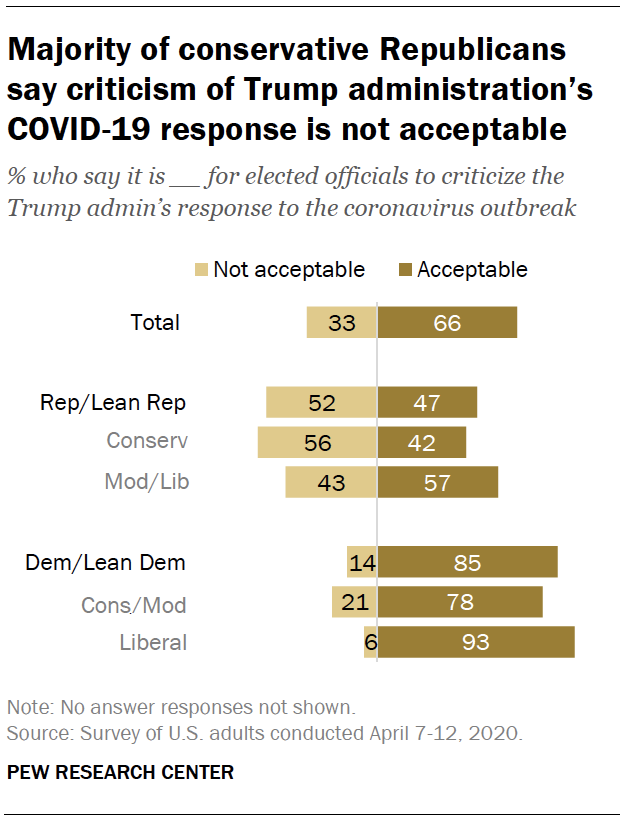 Republicans and Republican leaners are divided on this question: About half (47%) say it is acceptable to criticize the Trump administration’s handling of the outbreak if they think the administration hasn’t handled the situation well, while a similar share (52%) say such criticism is not acceptable.
Republicans and Republican leaners are divided on this question: About half (47%) say it is acceptable to criticize the Trump administration’s handling of the outbreak if they think the administration hasn’t handled the situation well, while a similar share (52%) say such criticism is not acceptable.
Among conservative Republicans, a 56% majority says criticism of the administration’s response is not acceptable, and 42% say it is acceptable. The balance of opinion is nearly the reverse among moderate and liberal Republicans: 57% say such criticism is acceptable while 43% say it is not.
While there is a similar-sized ideological gap in these views among Democrats, overwhelming majorities of both conservative and moderate Democrats (78%) and liberal Democrats (93%) view criticism of the Trump administration’s response to COVID-19 as acceptable.
Among Republicans, there are considerable demographic differences in views of critiquing the Trump administration’s response to the outbreak.
Republican men are significantly more likely to say it’s acceptable for elected officials to criticize the administration’s handling of the virus than GOP women (55% vs. 38%). And by a similar margin, Republicans under 50 are more likely than their older counterparts to see these critiques as fair game (55% vs. 41%).
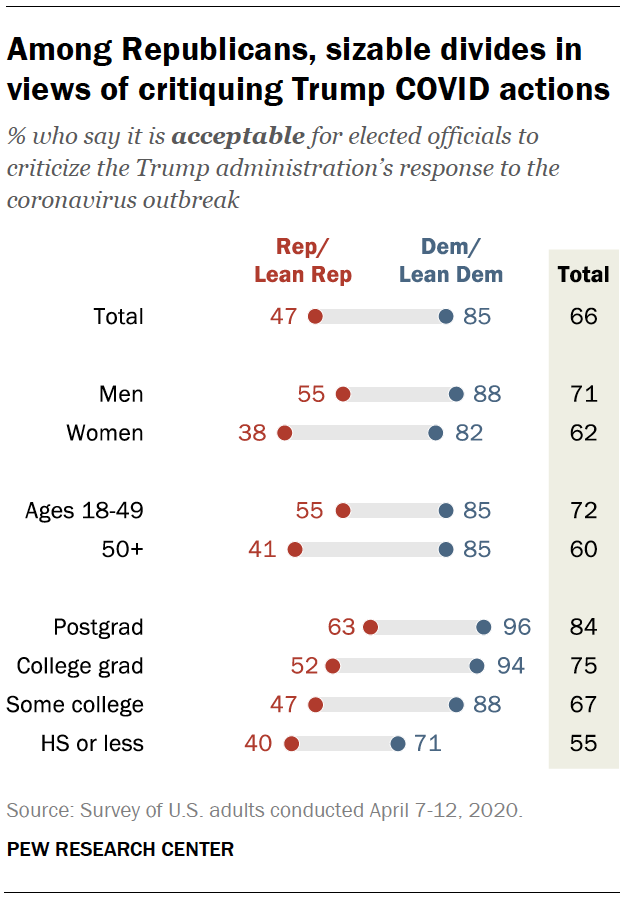 There is less variation in views by gender and age among Democrats. At least eight-in-ten Democrats in each group say criticism is acceptable.
There is less variation in views by gender and age among Democrats. At least eight-in-ten Democrats in each group say criticism is acceptable.
Adults with higher levels of educational attainment are more likely than those with lower levels of education to see criticism of the administration by elected officials as OK – a pattern seen in both parties.
For example, a clear majority of Republicans with a postgraduate degree say it’s acceptable for elected officials to criticize the administration’s response to the outbreak (63%), but a much smaller share of Republicans with a high school diploma or less say critiques are OK (40%).
Among Democrats, there is a similar-sized gap between postgraduates and those with high school diploma or less (96% vs. 71%).


 Data Tool: Survey Question on Trump's Response to COVID-19
Data Tool: Survey Question on Trump's Response to COVID-19